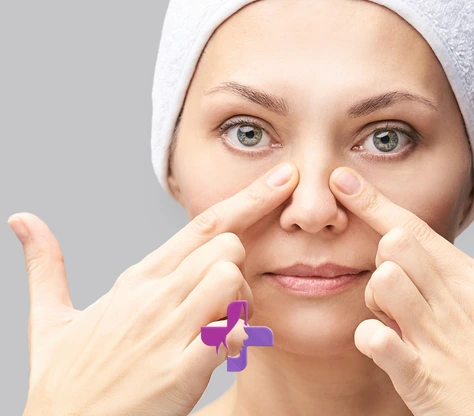Deviation can be explained as the partition separating the two nostrils not being in the middle. In other words, it is not visible from the outside and means the curvature of the nose inside the nose.
When deviation occurs, there is a difference between the air flow through one nostril and the air flow through the other nostril. For this reason, flesh growth develops on the opposite side of the deviation. As a result, obstruction occurs in both nostrils.
When viewed from the outside, what is seen medically is not deviation but deformation.

Nasal bone curvature or deviation describes a condition in which the nasal septum is curved or curled in a way that is not straight. This condition is usually congenital or can be caused by nasal trauma. Nasal bone curvature can make it difficult for a person to breathe and can cause various symptoms over time. Here is detailed information about nasal bone curvature:
Symptoms of nasal bone curvature can include
– Difficult breathing
– Frequent headaches
– Snoring
– Nasal congestion, especially when breathing through one nostril
– Chronic sinusitis (sinusitis)
– Nosebleeds
Nasal bone curvature is usually caused by abnormal growth or trauma to the bone or cartilage structure inside the nose. Congenital factors can increase the risk of nasal bone deviation. In addition, blows to the nose or falls on the nose can also trigger deviation.
A health professional diagnoses nasal bone curvature through a physical examination and imaging tests (usually endoscopy or computed tomography). Treatment options may include medications, nasal sprays or surgical intervention. Surgical correction is usually considered depending on the severity of symptoms and the patient’s general health.
After surgery, patients can usually return to their normal activities within a few days. However, the full recovery process can vary from person to person and it is important to follow specific guidelines in the post-surgical period. Regular follow-up visits are important to aid recovery as recommended by the doctor.
If you are experiencing symptoms of nasal bone curvature or are concerned about it, it is important to see a health professional. A professional evaluation is key to proper diagnosis and treatment.
Nasal bone curvature is a condition that often affects quality of life. However, it can be managed with the right diagnosis and appropriate treatment. If you have any concerns about nasal bone curvature, you can get more information and help from a healthcare professional. Remember, taking care of your health can improve your quality of life.
Each of the contents on this site has been prepared for informational purposes. Do not apply any of the treatment methods described on the site without the supervision of a doctor. Otherwise, the site management and Assoc. Prof. will not be responsible in any way for any problems that may arise. Dr. Osman Halit Çam is not responsible.
© 2023 – All Rights Reserved. Assoc. Dr. Osman Halit Cam
Last Updated: 25.07.2025